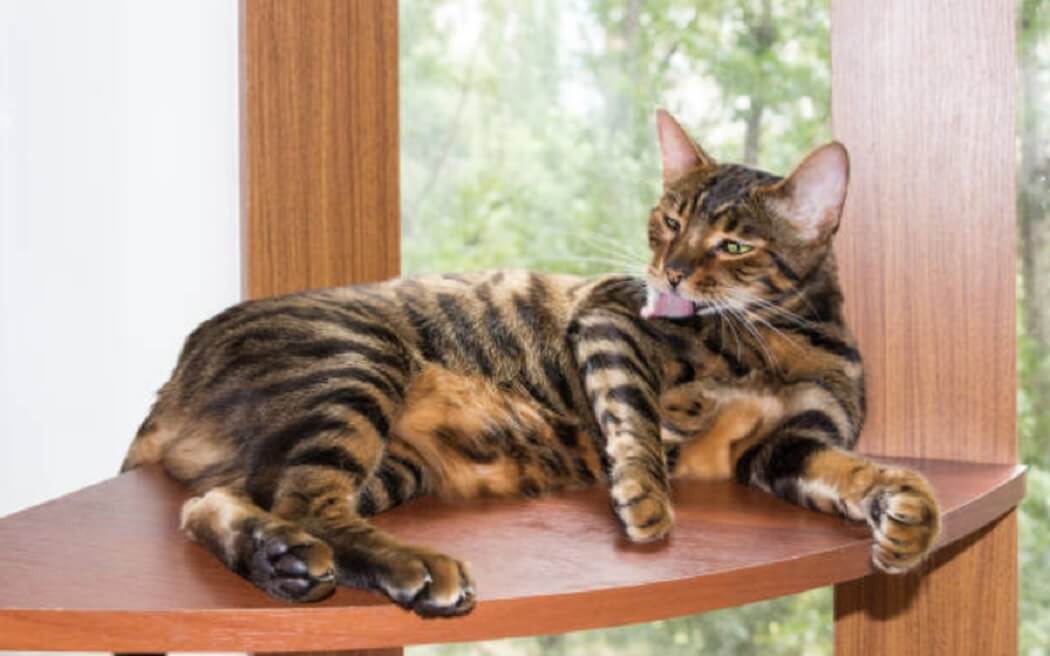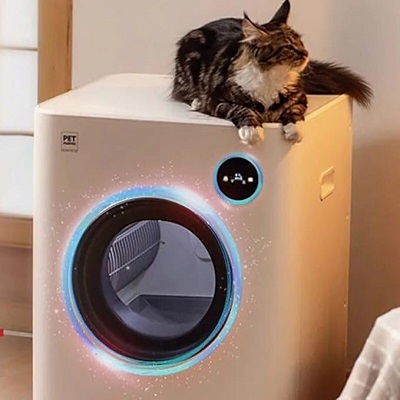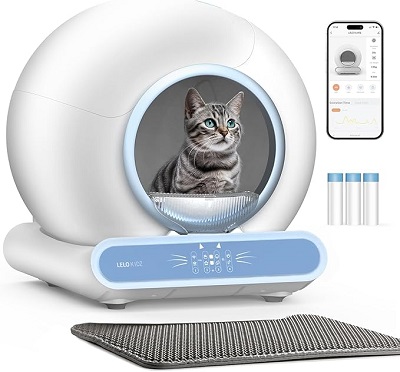
Toyger Cat: The Exotic and Playful Miniature Tiger
The Toyger cat is an extraordinary breed that resembles a miniature tiger, with its striking, spotted coat, muscular build, and bold patterns. Despite their wild appearance, Toygers are known for their affectionate, playful, and friendly personalities. The breed was specifically developed to resemble the look of a tiger, while maintaining the gentle nature of a domestic cat.
In this article, we’ll explore the history, appearance, personality traits, grooming needs, and health considerations of the Toyger cat, and provide tips on how to care for this beautiful and unique breed.
History of the Toyger Cat
The Toyger cat is a relatively young breed, developed in the 1980s by breeder Judy Sudgen. The goal was to create a domestic cat with the appearance of a wild tiger, without the wild temperament. The Toyger was bred by crossing Bengal cats (which are themselves hybrids of domestic cats and wild Asian leopard cats) with other domestic breeds, notably the Domestic Shorthair.
The breed name, "Toyger," is derived from a combination of the words "toy" (small) and "tiger", reflecting its tiger-like appearance in a smaller, domesticated form. Unlike hybrid breeds that may have more wild traits, Toygers were bred for their gentle nature and affectionate personalities, making them wonderful companions for families and cat lovers.
While Toygers were first recognized by The International Cat Association (TICA) in the early 2000s, the breed is still relatively rare. However, its striking appearance and engaging personality have earned it increasing popularity among cat enthusiasts.
Appearance of the Toyger Cat
The Toyger cat is an exotic-looking breed, designed to resemble a miniature tiger in both appearance and behavior. Here are some of the key characteristics that make this breed so unique:
-
Coat and Pattern:
The Toyger's coat is one of its most striking features, resembling the markings of a wild tiger. It has a short, dense, and luxurious fur coat with bold striped or spotted patterns that resemble a tiger's markings. These patterns are typically darker on a lighter coat, and the coat itself may have an orange-brown or golden color. The pattern is often described as "rosetted," with dark spots arranged in a tiger-like striping pattern across the body.The texture of the fur is also noteworthy—it is soft and plush, almost like velvet, and it has a natural sheen that gives it a glowing appearance in sunlight.
-
Size and Build:
Toyger cats are medium to large-sized with a muscular, athletic build. They are longer and sturdier than many other domestic cat breeds, giving them an almost wild or powerful look. Adult Toygers typically weigh between 8 to 15 pounds, with males being larger than females. Their body is compact yet powerful, designed to reflect the strength and agility of a tiger. -
Face and Eyes:
Toygers have round faces with a broad muzzle and a pronounced nose. Their eyes are large and almond-shaped, often golden or green in color, giving them an intense, captivating expression. The bright eyes, along with their unique markings, enhance their wild appearance. -
Ears and Tail:
The Toyger's ears are small to medium-sized, set wide apart on the head. Their tails are relatively long, thick at the base, and tapering to a point, resembling a tiger’s tail in both shape and movement.
Personality of the Toyger Cat
Despite their wild looks, Toygers are gentle, affectionate, and highly playful cats. They are known for their friendly demeanor and are excellent companions for active households. Here’s what you can expect from a Toyger cat’s personality:
-
Affectionate and Loyal:
Toygers are highly affectionate and will bond closely with their family members. They often enjoy being around their human companions and may follow them around the house. While they are playful and energetic, they also enjoy curling up for cuddles and quiet moments with their owners. -
Playful and Energetic:
Like their tiger relatives, Toyger cats are highly energetic and love to play. They enjoy interactive play with toys, especially those that mimic hunting behaviors, such as wand toys and laser pointers. They are also quite agile and enjoy climbing, jumping, and exploring their environment. Toyger cats need plenty of physical and mental stimulation to stay happy, so it's important to provide them with plenty of toys and climbing structures to satisfy their natural instincts. -
Intelligent and Curious:
Toygers are intelligent cats that can be easily trained. They enjoy problem-solving activities and can learn to fetch, walk on a leash, or even perform tricks. Their curiosity often leads them to investigate their environment, and they may get into things they shouldn't if not supervised. Their intelligence also means they require constant mental stimulation, so it's a good idea to keep them entertained with puzzle feeders, interactive toys, or training exercises. -
Sociable and Friendly:
Toygers are social cats and generally get along well with other pets, including cats, dogs, and even children. Their friendly and confident nature makes them adaptable to a variety of living situations, including multi-pet households. They thrive on attention from their family members, and while they may not demand it constantly, they enjoy being a part of the action.
Grooming and Care
The Toyger cat has a short, dense coat that is relatively easy to maintain. Here are some grooming tips to help keep your Toyger looking their best:
-
Brushing:
Due to their short fur, Toygers require minimal brushing. Brushing them once a week will help remove loose hair and keep their coat smooth and shiny. Regular brushing also provides a bonding opportunity and allows you to check for any skin issues or parasites. -
Bathing:
Toygers don’t need regular baths, but you can bathe them occasionally if necessary. Use a cat-safe shampoo and dry them thoroughly afterward. Their coat tends to stay relatively clean on its own, but bathing can help maintain its sheen and luster. -
Ear Care:
Like all cats, Toygers should have their ears checked regularly for signs of infection or wax buildup. Cleaning their ears with a soft cotton ball and a cat-safe ear cleaner can help maintain their ear health. -
Nail Trimming:
Regular nail trimming is essential for all cats, and Toygers are no exception. Trim their nails every 2-3 weeks to prevent them from becoming too long or sharp.
Health and Lifespan
The Toyger cat is a generally healthy breed with a lifespan of 12 to 15 years. However, like all breeds, there are some health issues to keep in mind:
-
Common Health Issues:
- Hypertrophic Cardiomyopathy (HCM): This heart condition is common in many cat breeds, including Toygers. Regular vet checkups can help detect any signs of heart problems early.
- Dental Issues: Like all cats, Toygers can develop dental problems such as gum disease or tooth decay, so regular dental checkups and brushing are important.
- Joint Health: Toygers are an active breed, and like other cats, they can experience issues such as hip dysplasia as they age, though this is less common.
-
Lifespan:
The Toyger cat typically lives between 12 to 15 years, with many living well into their teens with proper care.
Conclusion
The Toyger cat is a stunning breed with a unique appearance and a wonderful, affectionate personality. Known for their wild, tiger-like coat, energetic nature, and friendly disposition, Toygers make excellent pets for active families and individuals who can provide them with the attention, playtime, and stimulation they crave. With their playful nature and affectionate demeanor, Toygers can be the perfect addition to any home, providing years of companionship and joy.
Affiliate Products
We may earn a small commission when you shop through our links — it helps us keep sharing love and care for every dog out there, at no extra cost to you.
Up to 75% Discount

Cat Sandbox Automatic Collector
BUY NOW »
Up to 55% Discount

Self Cleaning Litter Box
BUY NOW »


